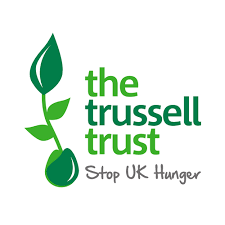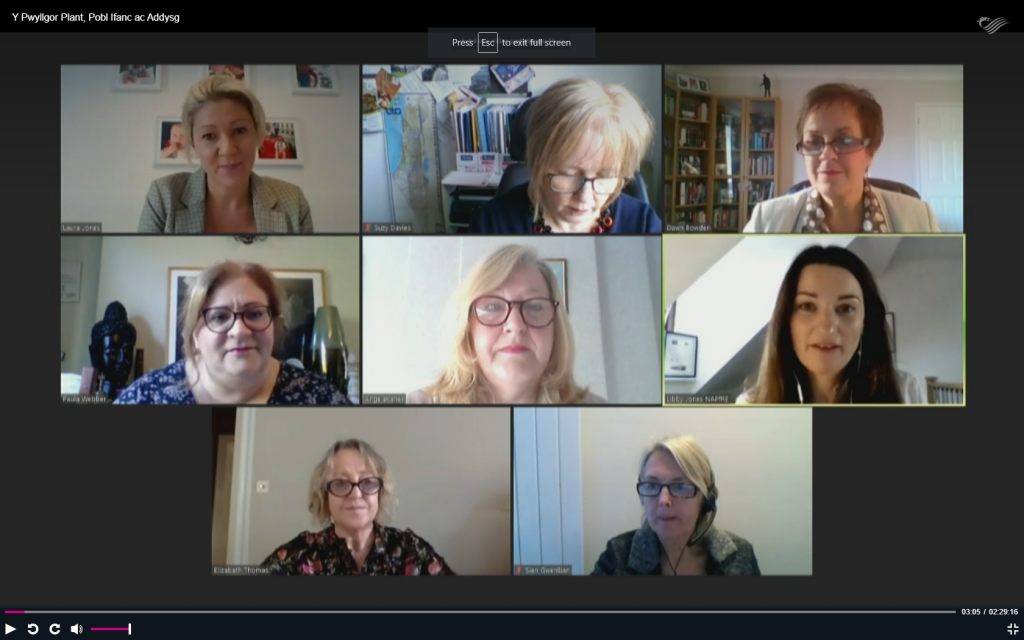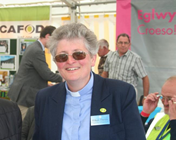FOOD BANK USAGE ON THE RISE DURING PANDEMIC
New figures released in November reveal that food banks in the Trussell Trust’s network across Wales provided 70,393 emergency parcels to people in crisis between April and September. 25,475 of these parcels went to children. These figures mark a 21% increase on the same period last year. These parcels were distributed by 117 distribution centres operating in all 22 local authority areas in Wales. The Trussell Trust’s food bank network brings together volunteers, staff and supporters of all faiths and none to make a difference. Local churches play a vital part in this work, by donating food, and providing venues, volunteers and financial support for food banks.
While the figures highlight increasing need, the Trussell Trust warns their new figures do not include the number of people helped by the countless new community organisations, independent food banks and local authorities, which have stepped up during the pandemic to support their communities.
The top three reasons for someone being referred to a food bank in the Trussell Trust’s network in Wales during April to September were low income (49%), benefit delays (10%) and benefit changes (8%).
Susan Lloyd-Selby, Operations Manager for Wales at the Trussell Trust, said,
“Across Wales, the resilience of volunteers in food banks has been nothing short of outstanding. They have been working hard under extremely difficult circumstances to make sure support is there for people struggling to afford essentials with the generous support of their local communities. But it’s not right that any of us are forced to a charity for food.
“In the last few months, we have welcomed vital steps taken by the Welsh Government to prevent people from falling into destitution such as their commitment to funding free school meals and strengthening the Discretionary Assistance Fund. It’s vital that support is in place for people when they need it most.

“This pandemic has shone a light on the difference we can make when we come together - we’ve made huge changes to the way we live, work and support each other. Together, we can end the injustice of people needing food banks. We can build a hunger free future.”
Across the UK, the rise in Trussell Trust foodbank usage was even higher than in Wales – at 47% – and this may reflect differential government policy in Wales as well as the level of spontaneous community response. However, Trussell Trust reports that foodbank usage has been rising steadily in Wales since August, and they are concerned that food banks will see high levels of need over the winter and beyond – particularly as redundancies recently hit a record high.
The Trussell Trust is asking anyone who wants to end the injustice of people needing food banks to join the campaign for a Hunger Free Future at trusselltrust.org/hungerfreefuture. It’s asking the UK Government to ensure money is kept in the pockets of people who need it most by:
- Locking in the £20 rise to Universal Credit, brought in at the start of the pandemic, and making sure that people currently excluded, such as people receiving payments through the legacy system, get this money too.
- Helping people hold on to more of their benefits by suspending benefit debt deductions until a fairer approach to repayments can be introduced.
A coalition of organisations in Wales has formed Food Sense Wales which is campaigning for better food for all across the nation, during the pandemic and beyond.
![]() ONE CHILD REPORTED MISSING EVERY HOUR
ONE CHILD REPORTED MISSING EVERY HOUR

New research by NYAS Cymru and The Children’s Society reveals that every hour another child in Wales is reported missing. The new report highlights how care-experienced children and young people are more likely to be reported missing than their peers. Despite making up only 1% of the child population in Wales, Freedom of Information requests found that 39% of the total missing child incidents recorded by local councils last year involved a child in care.
Children in Wales are more likely to repeatedly go missing than children in England, where Return Interviews are a legal requirement. Without effective intervention, children who go missing once are very likely to go missing again.
The report has been backed by all four Police and Crime Commissioners in Wales, as well as national charities and public bodies. It calls for:
- Independent Return Interviews to be a statutory requirement.
- An annual missing children data report should be published by Welsh Government to identify trends and areas for improvement. This report should provide an analysis of ‘push’ and ‘pull’ factors, and data on the number of Return Interviews offered and conducted in each local authority and police force area.
Tom Davies, Senior Policy and Public Affairs Officer for Wales, The Children’s Society, said “Many young people in Wales who go missing do not receive a return home interview. It is crucial that Welsh Government make Return Interviews a statutory requirement, to ensure that any young person in Wales who goes missing can talk about their experience and receive the support that they need.”
THE VALUE AND THE COST OF CARING
New Carers Wales research estimates that care provided by people looking after someone who has a physical or mental illness, is older or has a disability during the pandemic stands at £8.4 billion in Wales so far, after just eight months. That equates to £33 million per day. Furthermore, polling for Carers Wales found that 91% of adults in Wales think unpaid carers have been important during the COVID-19 pandemic, in supporting family or friends with disability or illness. However, despite the public’s appreciation of the vital contribution unpaid carers, only 7% knew that unpaid carers have legal rights. The Carers UK report is called Underseen and Undervalued.
Carers Wales are warning that people caring round the clock will break down after months of caring without respite and the support they need, so is calling on Welsh Government to commit to:
Carers Wales have launched a new Self Advocacy Guide and toolkit for unpaid carers, and the Deputy Minister for Health and Social Services Julie Morgan MS launched their Learning for Living online training for carers. This training is also available in Welsh.
NIGHT SHELTERS IN WALES 2020-21
Covid-19 has meant that night shelters cannot operate safely, due to the shared space and washing facilities. Furthermore, the use of rotating volunteers and venues brings further risk to everyone involved. Welsh Government have now made clear their position of moving away from night shelters, permanently. They have insisted that all emergency accommodation must give individuals access to their own room with washing facilities, and ‘priority need’ has been removed, meaning that Local Authorities have a duty to rehouse everyone. To enable this to happen they have provided significant funding so that Local Authorities can purchase or build more, better quality emergency accommodation for people experiencing homelessness.
This makes a significant difference to our Church night shelters, where individuals would have to leave the venue after breakfast, to find somewhere to spend the day, before returning in the evening. This is particularly challenging for the people we support as they often don’t have support networks to spend time with during the day or affordable places to go which are safe and warm.
Given the strength of action taken by our Government in Wales, it means that we, together with faith and community voluntary groups, can now move our efforts and resources upstream – to much needed prevention. Arguably, preventing homelessness is where we should be, to provide a fishing rod to those in need, rather than a fish, once they are already in crisis.
Consequently, at Housing Justice Cymru, we will not be running or supporting any night shelters, instead we have developed our Citadel project, which focuses on giving individuals the tools and support they need to deal with the pressures that are pushing them towards homelessness. Citadel trains volunteers to provide tailored support to those at risk of homelessness by helping them to set up and sustain their tenancy. This could be practical support, such as registering with a GP or accessing the food bank. It can also be on-going emotional support, connecting people to their community and helping to build confidence and resilience. Citadel works alongside Local Authorities and partner agencies to ensure all services are connected.
The pandemic has changed the way Wales responds to homelessness, and services are now in place so that no one has to be on the streets. If you are aware of someone sleeping rough please help them access their housing options team at their Local Authority and encourage them to engage with the support available. If you or your church or community want to help personally, you can pray, volunteer, fundraise for, or donate to organisations doing preventative work. It is vital, now more than ever, that we don’t sustain people on the streets. Food, support and accommodation is available.
For more information on how you can help or get involved with Citadel, please visit www.HousingJustice.org.uk/Citadel
Bonnie Navarra, Housing Justice Cymru
Changes to rules for DBS checks
The Disclosure and Barring Service (DBS) have announced changes to the ‘filtering rules’ for DBS checks. From 28 November, the DBS will change the filtering rules that determine which past offences appear on a DBS certificate. For jobs and voluntary roles that involve a standard or enhanced criminal record check issued by the DBS:
- all cautions received after the age of 18 years will be filtered after six years
- all convictions determined for persons under 18 years of age will be filtered after five and a half years
- all convictions determined for persons over 18 years of age will be filtered after 11 years
- convictions resulting in prison or a suspended sentence will never be filtered
The list of serious offences (‘specified offences’) which will never be filtered, is unchanged.
CLIMATE CHANGE – WHOSE RESPONSIBILITY IS IT?

Welsh Government designated November 2-6 – the original dates for the world climate change summit COP26 in Glasgow – as Wales Climate Week, with a full programme of online activities. People from across the world were able to join and hear about how one small nation, through its government and civil society, is responding to the climate crisis. You can see all the sessions on demand at https://waterfront.eventscase.com/EN/walesclimateweek/On-demand
Welsh Government was keen to include faith perspectives along with many others, so on Day 3 (Session 5) Cytûn’s Policy Officer, Gethin Rhys, on behalf of Climate Sunday, took part in a panel discussion with Friends of the Earth, Extinction Rebellion and the Centre for Alternative Technology. Climate Sunday also took the opportunity to relaunch its website in a bilingual format – www.climatesunday.org
The session was entitled Climate Change – whose responsibility is it? The three-pronged commitment we are asking of Climate Sunday supporters also offers a Christian answer to the seminar’s question:

- We are asking churches to hold at least one climate-focussed act of worship. While worship is a corporate act, it deepens our own personal relationship with our Creator God. So it reminds us that we each stand individually responsible before God. For us in the rich world, surely each Climate Sunday service must include some deep repentance for our lifestyle and how it is accelerating climate change.
- We then ask each church to make a long-term commitment as a community to one of the existing programmes to reduce our church’s carbon footprint and tackle the interlinked crises of climate and nature – such as Eco Church or LiveSimply. That reminds us that as individuals we live in community, and there are many steps – such as restoring nature on our church land or divesting our church funds from fossil fuels – that require action by the whole community.
Thirdly, churches are asked to sign up to The Climate Coalition’s ‘The Time Is Now’ declaration which is directed at politicians and world leaders – because climate change is the responsibility of people in positions of power. Decarbonising the national grid or creating a new national forest for Wales are not projects that an individual or even the most active church can take on – it requires governments to act with urgency. COP26 will provide a crucial platform for such commitments, but that requires politicians to believe that we, individuals and communities, care enough about tackling climate change to want them to commit to things that will, in turn, substantially change our lives.
So, whose responsibility is climate change? It’s my responsibility – and yours. It’s the responsibility of each church community and many other communities too. And it’s the responsibility of people in power. May our action over the next year of Climate Sundays help us and our leaders to shoulder our responsibilities for the good of God’s Creation.
OPPORTUNITIES AND CONCERNS FOR THE NEW CURRICULUM

Angela Keller, Adviser for Wales in the Catholic Education Service; Elizabeth Thomas, Provincial Director of Education for the Church in Wales; Paula Webber, Executive Officer of the Wales Association of Standing Advisory Councils on Religious Education (WASACRE); and Libby Jones, Chair of the National Panel for Religious Education (NAPfRE) giving evidence to the Committee. Also pictured are Committee members Laura Ann Jones MS, Suzy Davies MS (both Conservative), Dawn Bowden MS (Labour) and Siân Gwenllian MS (Plaid Cymru).
The Children, Young People and Education Committee of the Senedd are continuing to scrutinise the Curriculum and Assessment (Wales) Bill, which will provide the legal underpinning for the new curriculum in schools in Wales from September 2022. Witnesses representing church schools and religious education appeared nefore the committee on October 15 to provide evidence on the new role planned for Religious Education as ‘Religion, Values and Ethics’ within the Humanities area of the curriculum. All welcomed the ethos of the new curriculum and the opportunities it gives teachers and local communities to root children’s learning in their own locality (cynefin), while also expressing concern over some of the intended changes to the ability of church schools to continue to teach according to their religious ethos and also changes to the composition of the county Standing Advisory Councils on Religious Education (SACREs).
Welsh Government published on October 13 Curriculum for Wales: The journey to 2022, which sets out the intended timetable for implementation once the bill is passed. It encourages schools to begin work towards co-constructing their own local curriculum – within the national framework – as soon as possible (but recognising the difficulties of current circumstances). This requires people to work across traditional boundaries: between tiers of education as well as between disciplines, schools and phases, and with stakeholders beyond the education system (p. 5).Joint working with the local community is emphasised throughout the document. This provides a real opportunity for churches – and many others in the community – to become involved in developing the teaching and learning in their local schools. The document warns schools that they should not invest in ‘off the shelf’ ready-made curriculum offers. Cytûn member churches and organisations are therefore encouraged not to produce traditional ‘teaching resources’ which teachers can pick up and use, but rather to engage with each school in a creative way. This is a challenging task, but also a great opportunity to build positive relationships with schools across Wales.
Details of the concerns regarding the future status of church schools can be seen in the supplementary evidence submitted to the committee after the hearing by the Church in Wales and the Catholic Education Service. Concerns around the composition of SACREs are addressed also in these papers and in the written evidence from the Wales Association of SACREs.
CONGRATULATIONS TO EILEEN DAVIES

The Very Revd Canon Eileen Davies, Archdeacon of Cardigan and founder of Tir Dewi, has been awarded an MBE for her services to farming in west Wales. She is shown in this picture in the Cytûn pavilion at the Royal Welsh Show in Llanelwedd.
Tir Dewi was first launched by the Diocese of St David’s in the Church in Wales in the summer of 2015 and since then it has given practical help to hundreds of farmers and their families who were, in one way or another, facing a crisis. There is now a network of 60 volunteers, from many faith and belief backgrounds, across Wales, which means that farmers and their families have more support when they most need it.
Tir Dewi can be contacted by phone on 0800 121 47 22 or via the website https://www.tirdewi.co.uk/
ASYLUM SEEKERS AT PENALLY CAMP PEMBROKESHIRE
Unexpectedly, the Home Office placed a number of asylum seekers in the disused military camp at Penally Tenby. Cytûn works through the operational group set up to oversee the care of the service users placed there, and has been making representations on their behalf to the Home Office. We have been active in establishing an interfaith chaplaincy to offer them pastoral and spiritual care. Many thanks to the Reverend Rob James for working closely with the local Muslim community and others in offering care. Plans are currently being put in place with a number of partners in preparing for Christmas at the camp.
On November 18, the Senedd agreed by a large majority a resolution that it:
1. Believes that the UK Government should have held discussions with the Welsh Government and local representatives before housing asylum seekers at the Penally military base, near Tenby;
2. Believes that the decision should be reconsidered because it is an unsuitable place for asylum seekers, as it is isolated from appropriate support networks;
3. Condemns the violent protests organised by far-right groups from outside Pembrokeshire;
4. Praises local residents and volunteers from across Wales who have welcomed and supported the asylum seekers.
First Minister Mark Drakeford MS said,
“Wales is a Nation of Sanctuary. We take that seriously, and so should the Home Office.”
The concept of Wales as a Nation of Sanctuary was initially developed by Cytûn with other partner organisations who work with refugees and asylum seekers in Wales, and has subsequently been adopted as policy by the Welsh Government.
Cytûn – Churches Together in Wales
Room 3.3, Hastings House, Fitzalan Court (opposite Brunel House), Cardiff CF24 0BL
Office tel: 03300 169860
E-mail: post@cytun.cymru www.cytun.co.uk
Twitter @CytunNew
Publication date: 1 December 2020. The next bulletin will be published on 1 February 2021.
